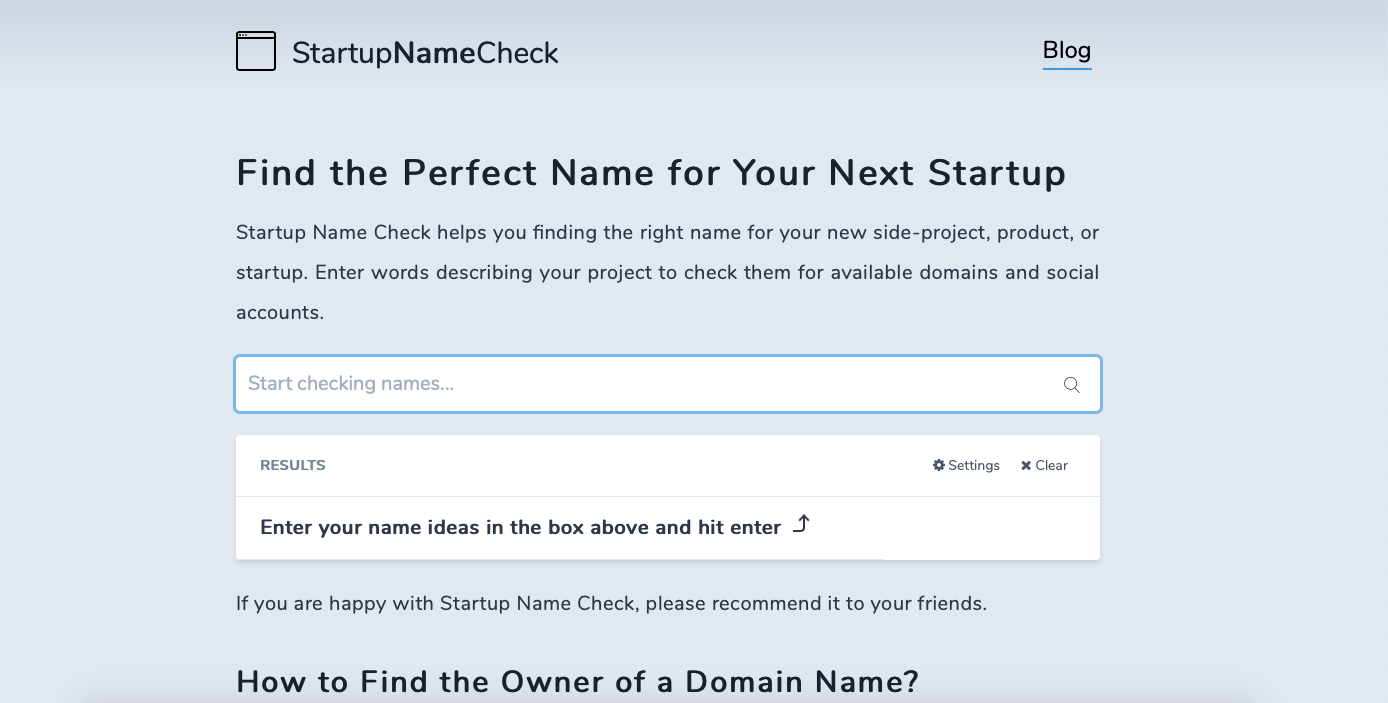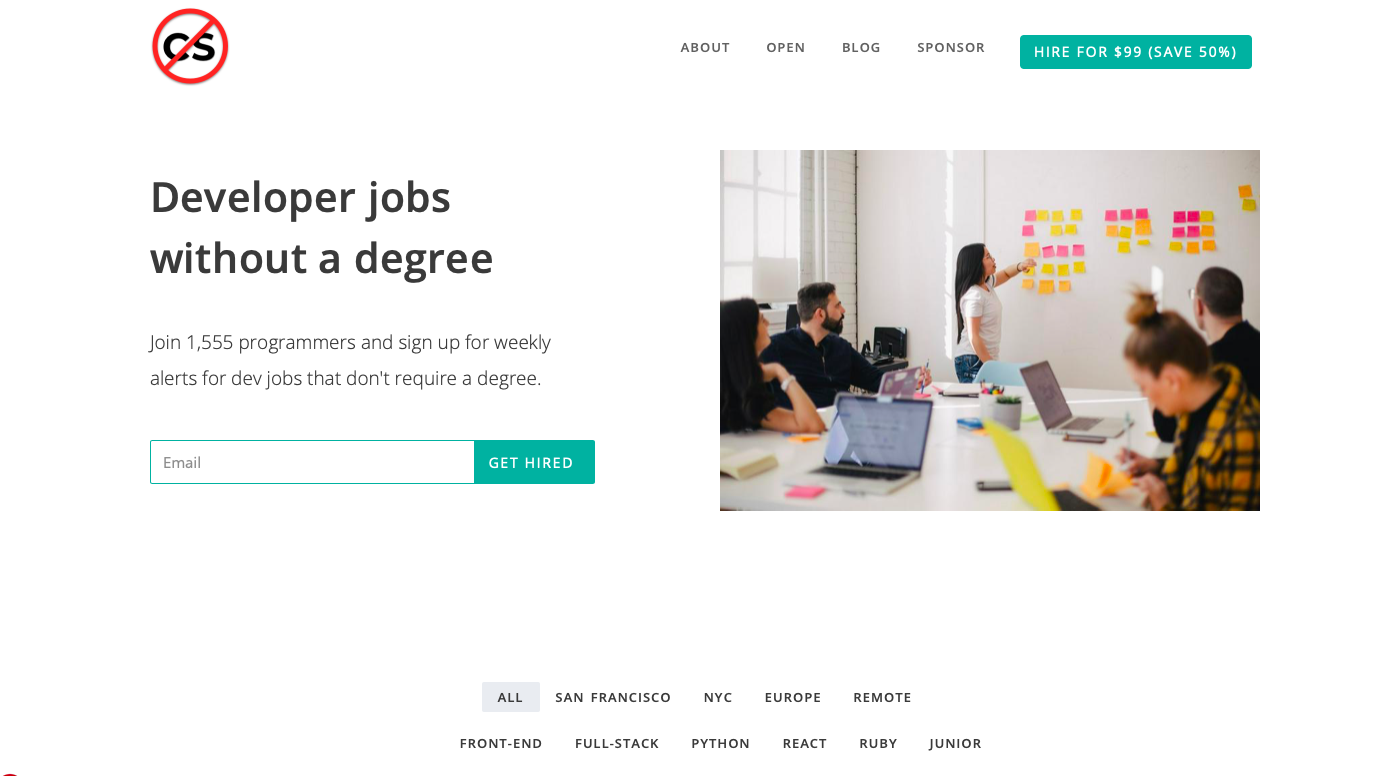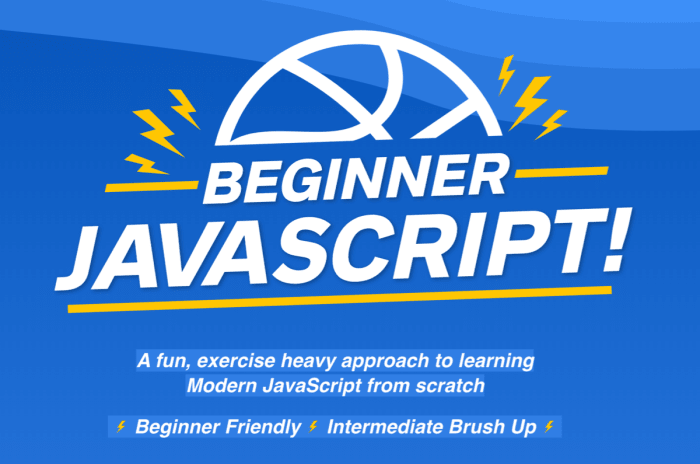I'm a huge fan of Peter Thaleikis's Startup Name Check website! It lets you enter a name for a website and it tell you whether the .com, .co or .io is free. But even better, it tells you if the Twitter, Instagram and Facebook pages are free for the name as well (and a recent update has extended the features even more). It's an awesome way to research a brand name when you get inspired! Peter is a self-taught developer and I chatted to him about how got into coding without a degree, getting his first job and his tips for beginners.
Hey, so can you give us a short introduction for people who want to know more about you?
Hey, I’m Peter, a self-taught developer from Leipzig in Germany. However, I’ve been living and working abroad for around six years in several countries including New Zealand, Taiwan and Thailand. Currently, I’m located in the Sukhumvit area of Bangkok. Next stop is Georgia (the country) for a change of scenery, not-so-hot weather and easier visa conditions.
As a child, I wanted to become an astronaut and took all kinds of electronics apart in the hope of discovering their inner ways of working. This changed when I discovered computers and the internet around the age of 12 or 13. Since then, I've always wanted to be a software engineer. Fast forward to the beginning of 2020, I’m running a small development company for Laravel and SilverStripe development. Besides this, I have built some small side-projects such as Startup Name Check, Which Login, the SEO Tool Extension and a new recently published fun project called Naming Tools.
If you don’t have a CS degree, how did you learn coding? Did you do any particular courses or bootcamps?
Back when I started showing interest in computers, the online world looked very different. Learning resources were rare. Most sites and services available now didn’t exist. No Stackoverflow, no GitHub, not even Google - at least I didn’t know about them in 1996.
My learning started with books about C (kids: don’t try this at home). Once I got a dial-up modem (if you didn’t have one: that’s how the internet sounded to me) and was online I found SelfHTML. It’s a website sharing the absolute basics like HTML and CSS to build websites. This was the spark to get me started.
Around the same time I started learning Perl. It allowed me to build dynamic websites for the first time. What an achievement for a geeky teenager just discovering the internet! I was 100% sold on the path of developer and saw a great chance to combine it with my entrepreneurial spirit. This was also fueled by the rising popularity of internet companies around the world - the dot-com bubble was on the rise at the time. Right when I left school around 2000, the dot-com bubble found an end and the idea of starting an online business as a 16 year-old seemed crazy instead of normal again.
You’ve made Startup Name Check which I find really useful for checking out what domains and social media handles are available! Can you talk us through the tech behind that and how you made it?
Sure! Startup Name Check became quite a useful and popular tool to check names over time. I still can’t believe that over half a million searches have been made since I launched it on ProductHunt less than two years ago. The project started off as a learning exercise. I thought “let me try to build something quickly, launch and experiment on it”. The goal was never to earn money (although the affiliate links sometimes bring in a few Euros).
The backend using Laravel was quickly done and the frontend was adopted from a Bootstrap 4 example of a login form. In the first version you could only check Facebook, Instagram, Twitter as the domain extensions for .com, .co, .io - pretty basic really. It wasn’t overly fast either. I still launched it and found some people who liked it.
The second version extended the functionality to over 50 networks and domain extensions. It brought also suggestions, which only a few people were fond of. I’ve also tried to monetize it as a service - that failed utterly. No one was keen on paying for it and I had no clue how to market it more. At some point I made it completely free again - this way, at least it was used.
The third version included push notifications and queued jobs on the back to increase the speed significantly. At the same time it was all turned into a neat VueJS app. Thomas Petracco and Kamban helped me a lot with this one. Especially in 2019, I’ve used the project to run SEO experiments with it and learn content marketing using it.
In the most recent version released January 2020 the project got redesigned and cleaned up. It’s now using TailwindCSS instead of Bootstrap. As you can see, the spirit of the project as an experimental platform remains up until now.
How did you get your first programming job/ freelance work?
During a training program a teacher noticed my talent for development accidentally. He noticed that something was odd: all students got really good grades in the group I was in. I developed a real-time chat application to use in the intranet while the internet access was switched off during exams. We helped each other out. He found out what was going on by tracking the network traffic on the router - leading right to my machine. We chatted and he invited me to join him for a regular meetup of developers he was part of.
Later, after I finished my degree in electrical engineering at HTWK Leipzig, I mentioned me finishing university at the previously mentioned meetup. One of the developers at the table mentioned casually that his employer is hiring. Due to a shortage of suitable developers, he explained, his company offered great on-the-job training with full pay and fast track to advance within the company. I applied and got invited to a written coding test in PHP (which I’ve never used before). Thanks to my ‘playing’ with different languages and Perl being quite similar I got enough points to pass and I got an offer. The next Monday, I started as a junior developer for a language I’ve not used before - that was literally learning as you go.
Did you have any specific people that inspired you to learn coding?
The above mentioned teacher was definitely an inspiration. He gave me a reason to believe I could do more than just playing around and helped me to find my path in that early phase. Otherwise I can’t say that many people inspired me much as I’ve been pretty much by myself in front of my massive CRT screen.
How has your life changed since becoming a professional programmer?
Thanks to my early focus on software engineering, I’ve got much more freedom than most people. I live wherever I want, most of the time work whenever I want and for a good chunk of my time I work on what I want.
I have not achieved the “we are going IPO next month”-type of success and that’s fine. Building a big business comes at much greater costs than most people think. I’m simply happy to be away from the 9-to-5 drudgery, office politics and decide on my life and pace freely.
Running a small development shop, slowly shifting from contracting work to selling self-developed products while having lots of freedom sounds like a good deal to me personally. Without software engineering, none of this would be possible.
Has anyone ever asked about your coding qualifications when you have been talking to clients? Do you think a CS degree is unnecessary now?
I’ve been asked for everything from code examples, to work-references, to my GitHub username. I’ve also been asked to do example projects. But not once since I’ve started working as an employee and later as a freelancer, have I been asked for a degree or any other proof of my qualifications. At the beginning it was something I was surprised about. Later it become normal. I guess it’s because you can’t really tell from a piece of paper if someone is good at something.
For most jobs, the best people are the ones who are naturally interested in what they do. This holds up for programming as well as for other industries. Anyone who wants to spend days inside staring at a screen to figure something out when there is great weather is a great candidate for programming.
What advice do you have for someone who wants to get their first programming job but they don’t have the time or money for a CS degree?
Learning to develop isn’t limited by money anymore. Enough great free resources are available to learn anything these days. For many people, the hard part is figuring out where to start and staying off Facebook and Instagram.
If I had to start again, I would follow a similar path. Keep it simple and start with the absolute basics. HTML5 & CSS3 will come in handy for most developer jobs. Depending on your experience level I would suggest spending a few days studying these using free resources. Don’t go too deep - stick to learning the basic concept instead of details.
Then jump into a well-documented and active backend language. Skip JavaScript for now - you can learn this once you’ve got the backend-frontend separation internalised. Despite its reputation, PHP is a great starting point: very active community and many great people and projects to learn from. After all, most of the Internet still runs on PHP: Billions of WordPress blogs around the world, massive websites such as Wikipedia and Facebook are written in PHP (or a PHP-fork). Same as with HTML and CSS, I would start with getting the basics down first: output HTML to browser, accepting data on the backend side, processing strings, handling arrays, etc. They are the basics to do anything on the backend really.
Once you’ve got these move onto a framework. Laravel is not just the most popular PHP framework, it’s also extremely well documented. You also get the chance to use many great learning resources and tutorials - often for free. If you get stuck ask on Twitter or Stackoverflow - there are literally hundreds of thousands of Laravel developers to help.
Can you tell us what an average day looks like for you just now? What are you working on and what is your lifestyle like?
Living in Bangkok brings quite a regular day-by-day life for me. I usually wake up without an alarm, read a bit before getting breakfast with my girlfriend (also a digital nomad) in a street food restaurant near our house. Then we grab a coffee before heading to the coworking space. It’s just one station from our house, but the heat makes walking not so pleasant. At only around 35 Euro per year(!) the coworking space is unbelievably cheap. AIS DC, just in case you or anyone is heading to Thailand.
Most days, I work on client projects until we have lunch, which is whenever we get hungry. In busy times, client work stretches into the afternoon and that’s fine. It pays the bills and allows me to have a pretty comfy life. Whenever I’m not on client work I spend time updating my side-projects, working on marketing or building new side-projects. Around 8-9 pm we usually head for dinner and spend a bit of time watching a movie or documentary at home - pretty boring regular life really.
Have you ever had imposter syndrome and if so, how have you dealt with it?
Learning as you go is great, but comes with downsides. A big one is the slippery slope to imposter syndrome. I often get the feeling that I’m just completely ‘winging it’, know (almost) nothing, and just figuring everything out as I go. If you aren’t careful, this can lead to a feeling that you and your work aren’t worthy. I think especially self-taught developers go down this path often and don’t think they are ‘real’ developers.
Whenever I notice this feeling creeping up I take a break, maybe watch a live stream of a rocket launch as distraction, and most of all spend some time thinking about my humble beginnings. The times with Notepad on Windows 3.11, the spinning gifs and all the interesting projects I’ve worked on since then. Looking up from there to where I am now helps to put things into perspective.
Depending on your personality, another successful approach is checking statistics. A look at the growing traffic of my side-projects and the growing business of my development company gives a sense of achievement too.
Do you have any other projects similar to Startup Name Check in the works? I think building for makers launching websites is a smart place to be!
I definitely do, two are in the works right now. As mentioned, 2019 was mainly focused on learning the basics of SEO and content marketing. In 2020, I’m planning to use this in combination with my development skills to hopefully create revenue streams besides contracting work. The project goal is to make content marketing more simple. I keep myself intentionally vague as I don’t want to talk too much about it until I’ve made some more progress. End goal is to win my first paying non-contracting clients this year.





